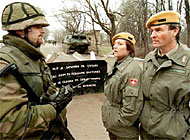
Parliament votes to arm Swiss troops on peacekeeping missions

Switzerland's parliament has given the go-ahead for plans to arm troops taking part in international peacekeeping missions. But voters will have the final say on the issue next year.
The House of Representatives on Tuesday joined the Senate in approving the measure.
During the debate, the defence minister, Adolf Ogi, reiterated that Switzerland had to increase its military involvement to remain credible for the international community.
But he pledged that any such move would not infringe Swiss neutrality and every deployment would be decided on a case-to-case basis. He ruled out any combat or peace enforcement missions.
The army has been providing support for the multinational force in Bosnia-Herzegovina since 1996 and is currently taking part in the peacekeeping operation in Kosovo. The troops have not been fully armed.
In 1996, Switzerland also joined Nato’s Partnership for Peace Programme, but the government repeatedly ruled out Nato membership, saying this was incompatible with Switzerland’s neutrality.
The Senate in June voted to make the deployment of the troops dependent on a mandate by the United Nations or the Organisation for Security and Cooperation in Europe.
In the debate on Tuesday, speakers from the centre-left Social Democratic and Green Parties demanded in vain to include peace promotion, rather than peacekeeping in the amended law.
Left- and right-wing political circles are set to challenge the decision in a referendum.
The right-wing People’s Party and the powerful pressure group, Action For an Independent and Neutral Switzerland, say participation in international missions is in breach of Switzerland’s long-standing neutrality.
The political left, including the Group for a Switzerland without an Army, has threatened to join moves to force a referendum.
by Urs Geiser

In compliance with the JTI standards
More: SWI swissinfo.ch certified by the Journalism Trust Initiative




























You can find an overview of ongoing debates with our journalists here . Please join us!
If you want to start a conversation about a topic raised in this article or want to report factual errors, email us at english@swissinfo.ch.